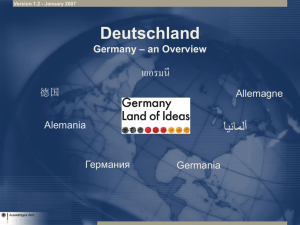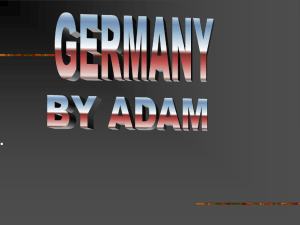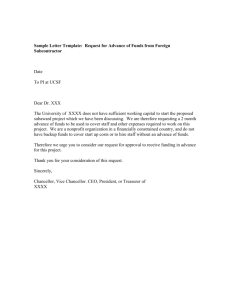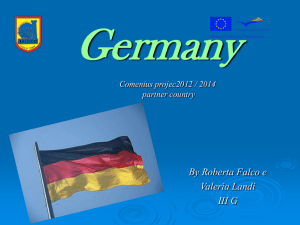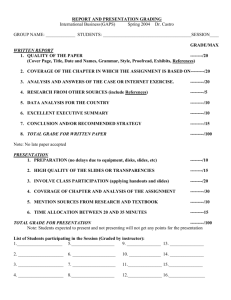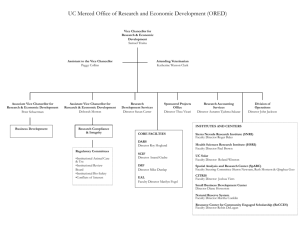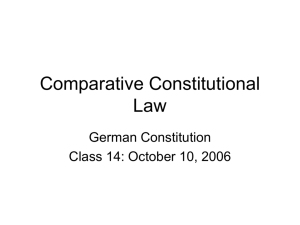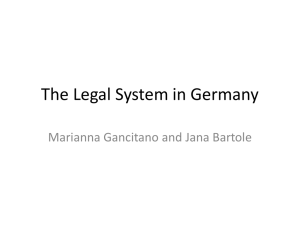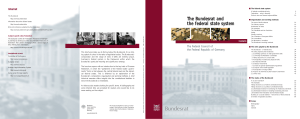Castro Mayra Castro Mr. Snape English II Honors 24 April 2012 The
advertisement
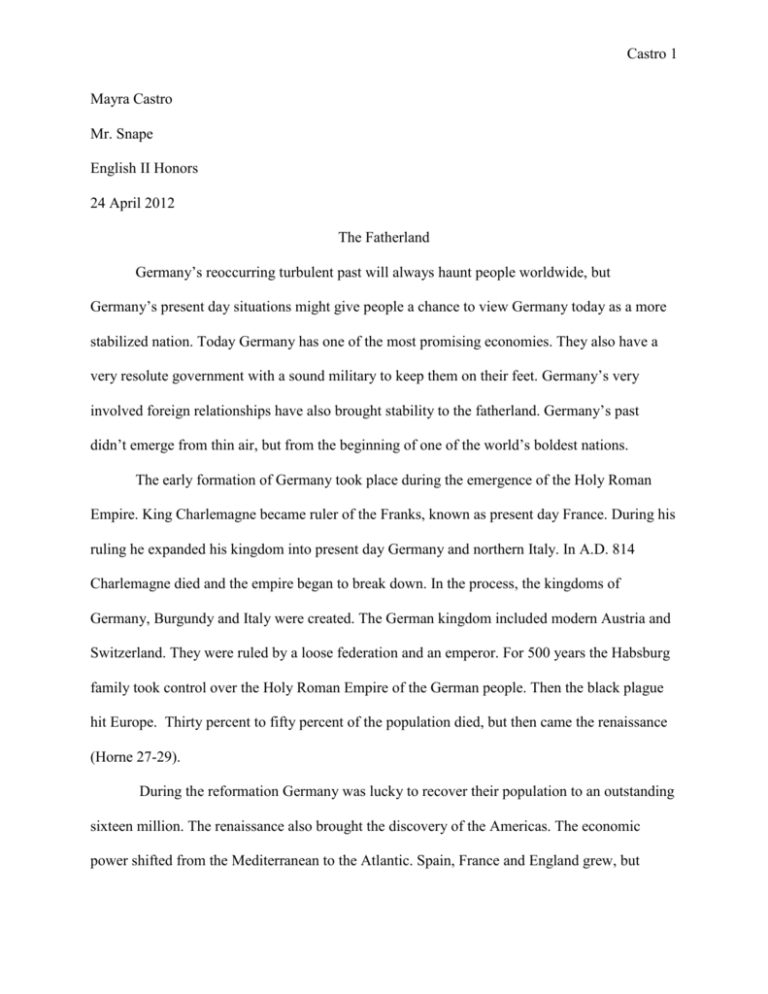
Castro 1 Mayra Castro Mr. Snape English II Honors 24 April 2012 The Fatherland Germany’s reoccurring turbulent past will always haunt people worldwide, but Germany’s present day situations might give people a chance to view Germany today as a more stabilized nation. Today Germany has one of the most promising economies. They also have a very resolute government with a sound military to keep them on their feet. Germany’s very involved foreign relationships have also brought stability to the fatherland. Germany’s past didn’t emerge from thin air, but from the beginning of one of the world’s boldest nations. The early formation of Germany took place during the emergence of the Holy Roman Empire. King Charlemagne became ruler of the Franks, known as present day France. During his ruling he expanded his kingdom into present day Germany and northern Italy. In A.D. 814 Charlemagne died and the empire began to break down. In the process, the kingdoms of Germany, Burgundy and Italy were created. The German kingdom included modern Austria and Switzerland. They were ruled by a loose federation and an emperor. For 500 years the Habsburg family took control over the Holy Roman Empire of the German people. Then the black plague hit Europe. Thirty percent to fifty percent of the population died, but then came the renaissance (Horne 27-29). During the reformation Germany was lucky to recover their population to an outstanding sixteen million. The renaissance also brought the discovery of the Americas. The economic power shifted from the Mediterranean to the Atlantic. Spain, France and England grew, but Castro 2 Germany declined. The economic depression brought poor harvest and much of these misfortunes were blamed on the Jewish people. There was a thirty year internal war between the Holy Roman Empire and the princes of Germany. The princes demanded more independence which led to a devastating war that took Germany a century to recover from. The Treaty of Westphalia ended the war and reduced the power of the Hapsburg family (Horne 29-33). During the Napoleonic era Germany/Prussia gained land in the Rhineland and Westphalia and gave up some territory in Poland. Then the actual country of Germany was formed when Otto von Bismarck became prime minister of Germany/Prussia. In 1864 he was set to enlarge the boundaries of Germany/Prussia through war with Denmark. In 1870 their war with France helped Germany regain their lost land, Alsace and Lorraine. The German federation became the German confederation. When Bismarck became chancellor he turned Germany to an empire. Then the Russia, Austria and Italy alliance broke in 1887 which led to Bismarck’s resignation in 1890 (Horne 36-37). In 1907 Germany’s major rivals, France, Great Britain and Russia, formed an alliance. Germany felt threatened. When Franz Ferdinand was assassinated in 1914, World War one broke out. The Treaty of Versailles ended the war on June 28, 1919. The treaty left Germany in economic disarray and left them to depend on the United States. In 1933 Adolf Hitler made the Nazi Party and was soon elected as Germany’s chancellor. He took control of all aspects of society and abolished the parliament. When Germany’s president, Hindenburg, died Hitler took over his place. The Third Reich was born. Hitler rebuilt Germany’s army, navy, and air force. He sent troops to Rhineland to take back their lost land. Germany then annexed Austria and claimed Sudetenland. After the invasion of Poland World War two erupted. Luckily in June 6, 1944 Germany was pushed back to their previous borders. That day will forever be remembered as D- Castro 3 Day. The Allies were never able to capture Hitler because he ended up committing suicide (Horne 37-42). When Germany was defeated it was broken up into four zones by the victors France, Great Britain, the United States and the Soviet Union. Stalin, the leader of the Soviet Union, planned to take over the capital of Berlin. He had Walter Ulbricht to go into Berlin and gain control by free election, but he failed to do so. So Stalin tried to force the western sector of Berlin into submission by closing off land access. This caused Germany to split into a western democratic side and an eastern communist side led by Stalin. The eastern side was quite prosperous, but soon enough it began to demoralize and go bankrupt. Their natural resources were short and they were desperately inefficient. In a desperate act of salvation West Berlin relaxed their old travel restrictions and brought down the Berlin Wall. Germany was reunified (Horne 37-42) (Rise). Since the fall of the Berlin Wall, Germany has become the Federal Republic of Germany with a parliamentary system of a democratic government. Germany is divided into länds which are similar to states. Each länd has their own constitution and laws that must fall within Germany’s constitution. They have their own parliament called ländtag consisting of a minister and a president. The cabinet manages state affairs. Each land is responsible for healthcare, education, public communications and cultural affairs. They also have their own police force that enforces local and federal laws. Each land also receives a portion of federal tax. Germany has something called a Bundestag and a Bundesrat who act as the parliament. The Bundestag is a federal assembly below the ranking of the Bundesrat. Each member is elected for a four year term. They have the power to elect a chancellor. The Bundesrat is the upper house to the Bundestag. They are a federal council consisting of sixty-nine appointed members. They have Castro 4 the power to veto. Germany, just like the United States, has a judicial branch. The highest court of appeal in Germany is the federal constitutional court. The Bundesrat and Bundestag appoint half of the members. In Germany there are five types of lower courts. The ordinary court is for civil criminals, labor court is for labor relations, administrative court is for disputes between citizens and the state, social court is for social programs and fiscal court is for tax matters. Germany’s executive branch includes the parliament, president and the chancellor. The federal president is elected by a secret ballot while the chancellor is elected through a more public election. The president may not serve more than two consecutive five-year terms, but the chancellor may be re-elected an unlimited number of times. The German President, whose powers are largely ceremonial and very limited, is the official head of the German state, but he or she does not exercise political power and acts instead more as a figurehead. Today, the Chancellor is widely considered to be the country's effective leader with actual power, but the chancellor may be removed from office if the Bundestag vote on it. All those officials aren’t the only ones protecting Germany; there is Germany’s army too. After World War two Germany was completely demoralized, but in 1955 West Germany was allowed to establish the Bundeswehr or the federal defense force. When Germany reunified in 1990, West Germany and East Germany consolidated. Now Germany has joint support services, central medical services, an army, a navy and an air force (Hamen 95-98) (Blashfield 63-68). With such a stable government it is no surprise that Germany’s economy has been able to prosper too. Germany manufactures iron, steel, chemicals and textiles. Even though coal mines have closed down, employment in the service industries have grown. They produce machinery, ships and optics along with large quantities of cement, electrical equipment, processed foods and beverages. They are the leading producers of wind turbines and solar technology. Germany is Castro 5 also the third largest automobile manufacturer. They produce some of the world’s top cars such as Benz, Volkswagen, BMW, and Porsche. The service industry makes up about seventy-four percent of Germany’s GDP per capita, while the farming business makes up one percent of it. Agricultural jobs employ 2.4 of the labor force as cooperatives have emerged and family-run farms slowly dwindle down. This makes Germany one of the world’s largest importers of agricultural goods. The only thing they produce is barley, potatoes, rye, sugar, beets and milk, but still there are crops that vary based on the area of farming. Near the Rhine and Mosel rivers, grapes are grown for wine production. Towards the northern coast dairy farming is most common. Germany has been doing well for a country that to this day is still paying war reparations from the First World War. The only struggle they have really encountered is the cost of modernizing the former East Communist Germany. With only an unemployment rate of five percent, Germany is flourishing quite fairly (Hamen 105-110) (Economy). Germany has also been able to get a better rap by establishing some good relationships with foreign countries. Germany has sought to improve its relationship with the countries of Eastern Europe. They have established trading agreements and diplomatic relations. Germany also continues to be active economically in the states of Central and Eastern Europe. They also continue to be active supporters of the development of democratic institutions. Germany is involved in a joint postwar effort aimed closer to political, economic and defense cooperation among the countries of Western Europe. They are also a large net contributor to the European Union budget. Some of their foreign relations include their membership in the North Atlantic Treaty Organization and their two year term as a non-permanent member of the U.N. Security Council. Germany is a key partner in the U.S. relations with Europeans in NATO and the European Union where they work side by side to maintain peace and freedom. The U.S. and Castro 6 Germany are friends and trading partners, but also allies sharing common institutions. Germany has extended their cooperation into military cooperation by maintaining peacekeeping efforts in the Balkans and working together with the U.S. to encourage the evolution of an open and democratic state. Following September 11, 2001, Germany has been a reliable U.S. ally in efforts against terrorism. Germany is an integral part of the U.N.-Mandated International Security Assistance Force in Afghanistan. They are the third largest troop contributor with five thousand plus soldiers. They also run the largest training program to train and mentor the Afghan National Army. (Turner 509-543) For a country to have such an uneasy past, making a better future is harder than one may think. Yet, Germany was able to rebuild itself from the ashes of two great world wars. They hold a stable government that pleases its citizens and they have established a virtuous economy to bring money into their country, but most importantly they have won the trust of nations worldwide. Castro 7 Works Cited Page Blashfield, Jean F. Germany. New York: Children's, 2003. Print. "Economy::Germany." Cia World Factbook. CIA, 3 Apr. 2012. Web. 10 Apr. 2012. <https://www.cia.gov/library/publications/the-world-factbook/geos/gm.html>. Horne, William R. Germany. New York: Infobase, 2007. Print. The Rise and Fall of the Berlin Wall. U.S. News. U.S. News, 13 Nov. 2008. Web. 9 Apr. 2012. <http://www.news.com/opinion/articles/2008/11/13/the-rise-and-fall-of-the-berlin-wall>. Susan Ehamen. Germany. Edina: ABDO, 2012. Print. Turner, Barry. The Statesman's Yearbook 2012: The Politics, Cultures and Economies of the World. Basingstoke: Palgrave Macmillan, 2011. Print.
